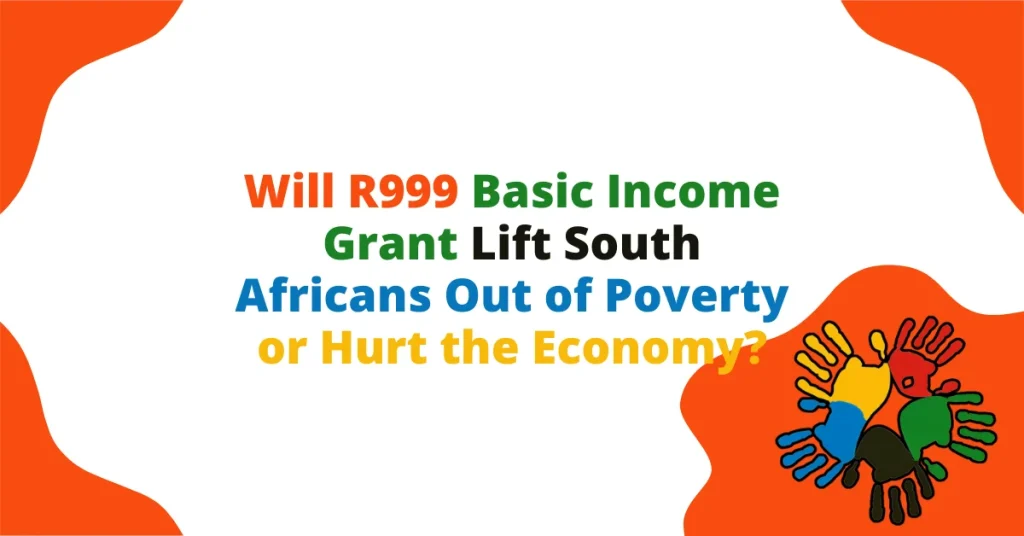As a journalist covering South African politics and economics, I’ve seen many bold ideas come and go. But recently, a story about a huge jump in the basic income grant caught my eye.
It got me thinking: could this be the answer to South Africa’s poverty problem? Or would it cause more harm than good? Let’s dig into the facts and separate truth from fiction.
Will R999 Basic Income Grant Lift South Africans Out of Poverty or Hurt the Economy?
The proposed R999 Basic Income Grant could impact South Africa in different ways:
- Boosts Consumer Spending – More money in households could stimulate local economies.
- Reduces Poverty – Direct financial support helps low-income individuals afford necessities.
- Strains Government Budget – Funding requires higher taxes, spending cuts, or debt.
- Risk of Inflation – Increased demand might raise prices, reducing the grant’s real value.
- Dependency Concerns – Some fear it may discourage employment and economic growth.
The Truth About South Africa’s Basic Income Grant
First things first: there is no R999 grant in South Africa. This is fake news that’s been spreading on social media. The real story is quite different:
- The actual grant is called the Social Relief of Distress (SRD) grant
- It was R350 per month until April 2024
- Now, it’s R370 per month
This grant helps millions of South Africans who are struggling to make ends meet. But it’s much less than the made-up R999 grant that’s been talked about online.
Why Are People Talking About a Bigger Grant?
Even though the R999 grant isn’t real, the idea of a bigger basic income is popular. Here’s why:
- High unemployment: Over 8 million South Africans don’t have jobs
- Rising costs: Food, transport, and housing are getting more expensive
- Poverty: Many people can’t afford basic needs
Some people think a bigger grant could solve these problems. They say it would:
- Help people buy food and other necessities
- Make it easier for job seekers to look for work
- Boost the economy by giving people more money to spend
What Would a Bigger Grant Cost?
Let’s imagine the government did raise the grant to R999. It would be very expensive:
- It might cost about R276 billion per year
- That’s a huge part of South Africa’s budget
To pay for it, the government might need to:
- Raise taxes
- Cut spending in other areas
- Borrow more money
Each of these options could have big effects on the economy.
Could a Bigger Grant Help Fight Poverty?
Supporters of a bigger grant say it could:
- Lift millions out of extreme poverty
- Help people afford healthcare and education
- Reduce crime by giving people a steady income
They believe that helping the poorest South Africans would make the whole country stronger.
What Are the Risks?
But not everyone thinks a bigger grant is a good idea. Critics worry it could:
- Cost too much and hurt the economy
- Make people depend on welfare instead of finding jobs
- Cause prices to go up, making the extra money worth less
- Be hard to manage and lead to waste or corruption
What’s the Real Story with South Africa’s Current Grant?
Let’s look at the facts about the actual R370 SRD grant:
- It helps about 10 million people
- It costs about R33 billion per year
- It’s meant to be temporary, but has been extended several times
While it’s not as big as the fake R999 grant, it still makes a difference for many families.
What’s Next for South Africa’s Basic Income?
South Africa has just gone through a major political shift:
- The general election took place on May 29, 2024
- For the first time since the end of apartheid, the African National Congress (ANC) lost its outright majority in parliament
- On June 14, 2024, the National Assembly elected a new President in an indirect election
These big changes will likely affect the future of the basic income grant. Here’s what we know:
- The current SRD grant of R370 per month is set to continue until March 2025
- With a new political landscape, there might be fresh debates about the grant’s future
- Different parties may propose changes to the grant as part of their policies
My Take on the Basic Income Debate
After looking at all sides of this issue, here’s what I think:
South Africa needs to find ways to help its poorest citizens. A basic income grant can be part of the solution, but it’s not a magic fix. Any changes to the grant system need to be:
- Carefully planned: To make sure South Africa can afford it
- Well managed: To prevent waste and fraud
- Part of a bigger plan: To create jobs and grow the economy
Most importantly, we need to be careful about fake news. The R999 grant story shows how easily false information can spread. It’s up to all of us to check facts and share the truth.
What do you think about South Africa’s basic income grant? Should it be bigger, smaller, or stay the same? These are the kinds of questions we’ll need to answer as we work towards a better future for all South Africans.
Contents
- 1 Will R999 Basic Income Grant Lift South Africans Out of Poverty or Hurt the Economy?
- 2 The Truth About South Africa’s Basic Income Grant
- 3 Why Are People Talking About a Bigger Grant?
- 4 What Would a Bigger Grant Cost?
- 5 Could a Bigger Grant Help Fight Poverty?
- 6 What Are the Risks?
- 7 What’s the Real Story with South Africa’s Current Grant?
- 8 What’s Next for South Africa’s Basic Income?
- 9 My Take on the Basic Income Debate
